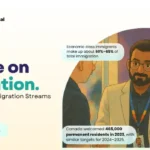Canada Now Shares Visa Refusal Reasons with Applicants
A Major Shift in Canada’s Immigration Transparency
Beginning July 29, 2025, Immigration, Refugees and Citizenship Canada (IRCC) started attaching officer decision notes to refusal letters for specific visa applications. This update marks a significant milestone in making the Canadian immigration system more transparent, fair, and applicant-centered.
What Are Officer Decision Notes?
Officer decision notes are detailed explanations written by the visa officer who reviewed a case. They highlight clear reasons for a refusal, such as:
- Missing or incomplete documents
- Insufficient proof of funds
- Weak study or work plans
- Eligibility gaps or inconsistencies
Previously, applicants received short and often unclear rejection letters. Now, IRCC includes these notes automatically, helping applicants understand exactly why their applications were refused. As a result, they can fix the issues and prepare stronger reapplications without filing separate information requests.
Who Receives These Notes?
Currently, IRCC provides officer decision notes only for refused applications under certain categories, including:
- Temporary Resident Visas (TRVs), except eTAs and TRPs
- Visitor Records
- Study Permits
- Work Permits
However, those applying through the new IRCC Portal will not yet receive these notes. IRCC plans to extend this feature once the system integration is complete.
How Applicants Receive Them
Applicants automatically receive the officer’s notes when their applications are refused. IRCC sends them with the refusal letter, either directly to the applicant or to their authorized representative. There are no extra steps, forms, or requests required.
In some situations, IRCC may remove parts of the notes to protect personal or security-related information. Despite this, applicants now get far more useful insight than before, making the process clearer and more efficient.
GCMS Notes for Deeper Insight
While officer decision notes give a brief summary, applicants can still request GCMS (Global Case Management System) notes for a deeper look into their file. These records, available through an ATIP (Access to Information and Privacy) request, include:
- Full officer observations
- Application progress details
- Internal communications and assessments
Applicants often use GCMS notes when the decision notes lack detail or contain redacted sections. This additional report helps them better understand how officers assessed their profile and what factors influenced the final outcome.
Who Can Request GCMS Notes
Only certain individuals can request GCMS notes directly. The right to request belongs to:
- Canadian citizens and permanent residents
- People physically present in Canada
Applicants outside Canada must use a representative located in Canada and sign a consent form. Because of this, many international applicants authorize an immigration consultant or lawyer to obtain the notes on their behalf.
When to Request GCMS Notes
Applicants can file a GCMS request once their file passes the R-10 completeness check, confirming that all required documents were submitted. However, it’s often more valuable to request them after a decision is made, since the notes will contain full observations and officer comments by that point.
Requesting too early may not provide any meaningful insight. Therefore, timing the request strategically ensures that the report includes all relevant information.
Why This Change Matters
IRCC’s decision to include officer notes transforms the immigration experience in several ways. It:
- Clarifies the exact reasons for refusals
- Helps applicants correct mistakes before reapplying
- Reduces unnecessary reapplications and appeals
- Saves time for both IRCC and applicants
- Builds transparency and public trust
Furthermore, this initiative supports Canada’s reputation as one of the most open and fair immigration systems in the world. It shows that Canada values communication, fairness, and accountability in every stage of the process.
What’s Next for IRCC’s Transparency Efforts
At present, this new practice applies only to select visa categories. However, IRCC intends to expand officer notes to additional programs in the near future. Officials are already assessing how to include more visa types without compromising processing efficiency.
As this policy evolves, it could set a global benchmark for immigration fairness. Other countries may follow Canada’s lead by providing applicants with clearer, written reasoning for refusals. Consequently, Canada is positioning itself as a world leader in transparent and responsible immigration governance.
Conclusion
Canada’s move to include officer decision notes represents a genuine transformation in immigration transparency. By giving applicants clear explanations, IRCC empowers them to learn, improve, and try again with confidence.
This change doesn’t just streamline the process—it humanizes it. It helps applicants feel heard, respected, and informed at every step. In doing so, Canada reinforces its image as a nation that values fairness, clarity, and compassion in immigration decision-making.
Get in touch with SPS Global
Receive professional advice on any of your questions regarding Canadian immigration. get in touch with us, experienced immigration consultants from SPS Global. For additional information, contact support@spscanada.com (Canada) or support.amd@spscanada.com (Ahmedabad), or by phone at (1) 905-362-9393 (Canada) or +919586226232 (Ahmedabad).


